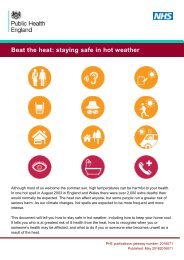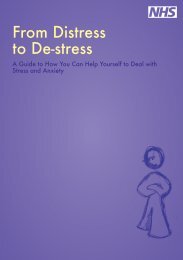Stress
Stress
Stress
You also want an ePaper? Increase the reach of your titles
YUMPU automatically turns print PDFs into web optimized ePapers that Google loves.
How <strong>Stress</strong> affects the body<br />
The <strong>Stress</strong> Response (Fight and Flight System)<br />
Our bodies are really good at protecting us from danger. When the body<br />
senses a threat it releases lots of the hormone adrenaline into the blood. This<br />
makes the body ready to react to the danger. It is an automatic reaction that<br />
you do not control.<br />
Imagine a caveman, hunting and gathering. If a sabre-toothed tiger jumped out,<br />
he needs to either fight it or run away (flight). Adrenaline makes the heartbeat<br />
and breathing faster. This gets blood to the muscles and brain. The caveman is<br />
now more alert. His muscles have more strength and can keep going for longer.<br />
When he has run away or fought the tiger, the effects of adrenaline wear off<br />
and his body then returns to normal.<br />
The problem is that our bodies have this ‘fight or flight’ reaction to things that<br />
stress us out, like driving in rush hour traffic. But we rarely flee or fight our way<br />
out of the situation. This means that the stress is not ‘burnt off’ and it keeps on<br />
affecting our bodies.<br />
The physical affects of stress can feel dangerous but it is normal. The table over<br />
the page lists the main symptoms of stress. It also explains why the body has<br />
that response.<br />
10








